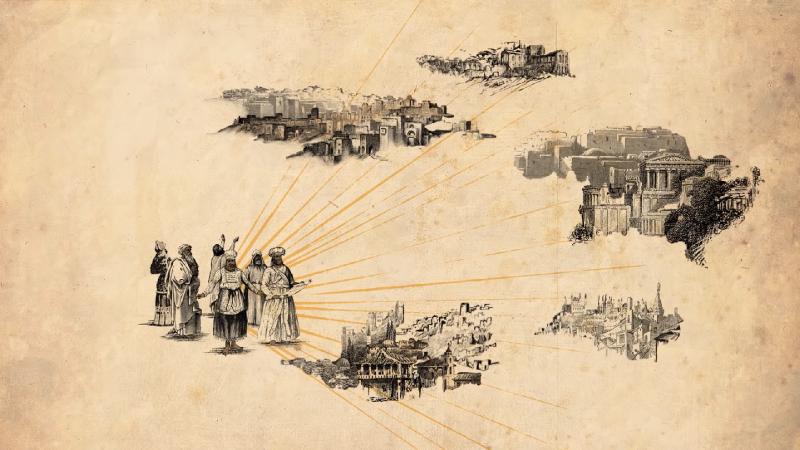The Book of Exodus Overview - Part 2 of 2



 |
 |
| |
|
After God delivers the Israelites from slavery in Egypt, He leads them through the wilderness back to Mt. Sinai where Moses first met Him in the second half of the Book of Exodus. There, the Israelites prepare themselves for a miraculous encounter with the Lord - God Himself will come down to the top of the mountain, where He will fellowship and establish Abraham's covenant with them! Moses spends 40 days with Him on the mountain, but the Israelites are afraid and stay at the bottom. The story takes a tragic twist when Aaron helps the Israelites fashion a golden idol and worship it - right at the foot of the mountain - while Moses is away. God considers wiping them out for the atrocity and making a new nation from Moses instead, but changes His mind when Moses intercedes and reminds Him of Abraham's Covenant, further showing us God's character of love and justice. |
 Article is LOCKED by author/seeder
Article is LOCKED by author/seeder






So what does the notion of God changing mind really mean? Religious NT's you are welcome to enter and share in a discussion of the "meatier" matters of your blessed faith!
I do not see how a perfect, omniscient entity would ever change its mind. It cannot be due to God learning something new since God already knows all. It cannot be due to God having made a mistake since God is perfect.
Hi Tig! Please define, "God already knows all." Omniscience. Its meaning to you. Also, can you explain God's perfection. Its meaning for you.
I ask you for these definitions, because as believers Christians use scriptures to weave together their definitions for the character of God. Whereas would we 'master' meaning for our deity, but from the canon of scripture. Thus, for instance, when the (closed) books tell us God is perfect and God can repent we must ponder how both can be so.
Cal, you tell me. What does it mean to you that God is omniscient and that God is perfect?
It really is pointless for me to paraphrase what I already described only to have you disagree. Just disagree upfront and give me the definitions that underlie your beliefs.
The languages we use in this world are for our purposes only. God has no other use for human points of views other than in order to communicate with us. Thus, it is my view (thereabouts because it is getting late here and my concentration is off), that God is perfect and omniscient to and for us—humanity.
What goes on in "heavenly places" we have no knowledge of beyond what we are told in the canon of our scriptures. In other words, it is a rather short-sighted person who thinks he or she can ponder the deepest things of God. Things which God has not bothered to explain.
Ultimately, the deep-thinking believer comes to realize that God is perfect, all-powerful, all-knowing and more when we 'gaze' at God from a human perspective/len.
More later.
It seems you are aligned with what I wrote. You consider God to be perfect (does not make mistakes) and omniscient (knows everything). So given that clarification, here again is my question:
I do not see how a perfect, omniscient entity would ever change its mind. It cannot be due to God learning something new since God already knows all. It cannot be due to God having made a mistake since God is perfect.
We do not know what God is from God's perspective. Or do you?
That has nothing to do with my question.
How is it even possible for a perfect God (who does not make mistakes) to change His mind (given He knows all to begin with)?
See Cal, this is an example of a question that believers simply will not consider. The question will not be honestly, objectively considered, it will be avoided.
God's ways are not humanities ways:
Isaiah 55:8-9 English Standard Version (ESV)
8 For my thoughts are not your thoughts,
neither are your ways my ways, declares the Lord.
9 For as the heavens are higher than the earth,
so are my ways higher than your ways
and my thoughts than your thoughts.
Beyond the canon of scripture, a man or woman, especially an unbelieving man or woman, can reason up a God-like being to suit him or herself. How can you plan to make it exist, nevertheless?
The believers who trust in God recognize there are limits to what scripture can tell us about God. And, the believer stops there. It makes PERFECT sense that God's own thoughts and ways would be SUPERIOR to any a created thing can negotiate. After all, we justly recently began to ponder our local surrounding universe. We have no notion of what is beyond!
And, of course, God exists in a realm apart from our natural order. We have no clue how such a realm could manifest itself.
So you can say you know God's perspective, thoughts, and ways; you can say you know what perfection for God is; you can say you know how change for God takes form; and, you can even suggest you know what God is locked into as an Entity:
Why should I believe you? When, and this is a fact, this whole exchange is a basis "head" discussion for you as an unbeliever anyway?
As I predicted, the question will not be honestly, objectively considered, it will be avoided.
Instead of answering the question you run to a strawman. Nowhere did I claim to know God's perspective.
This is a question of logic and biblical definition:
How is it even possible for a perfect God (who does not make mistakes) to change His mind (given He knows all to begin with)?
This is the kind of stuff that fascinates me about religious belief. I think you realize (in your gut) the contradiction but cannot bring yourself to even face it.
You think wrong. And, it fascinates me that you brushed off the canon of scripture I shared to continue a futile effort to define God beyond scripture. That is a problem with some humans' faith in their ability to reason and hold up unbelief as the thing. In your gut, you seem to think God is a Being you can ponder the deepest levels of nature and existence, all the while using limited skills meant to better understand humanity.
Incidentally, have you considered that God may have 'tools' of logic which extend beyond human logic? After all, humanity learns information about its surrounding across eons.
More next time. Good night.
Well there is a reason why you refuse to address the question. Given you refuse to even offer the reason one can only make an educated guess.
Labeling God 'perfect' and 'omniscient' defines God beyond scripture? Where do you think those attributes come from? Further, you asked me to define God in more detail and I suggested that you really should do that. You decline and then come back accusing me of improperly defining God.
Well, you refuse to offer something as moderate as your worldview while you dispute another member's Christian worldview. Maybe, I should take an educated guess that you are a materialist. Or would you like to state your worldview for the record?
Your use of an emoticon is interesting and its silliness does irreparable damage to the whole of your last paragraph. I will not respond to that. Sad, too.
Hello! This article is open for discussion.
WARNING:
Please do not be contemptuous, dismissive, arrogant, or vitriolic to your fellow members. This is a discussion. It is not a debate.
You may not leave unconvinced of anything new; but you can leave a better person.
If and when deemed appropriate abusive comments will be deleted
from the group unceremoniously.
We all can appreciate a vibrant, robust, stimulating discussion. However, treating others to diminutive language is harmful and serves no good purposes.
Why did Israel want Aaron (God new priest) to make for them an idol (god) they could see?
The Golden Calf experience is a clear indication that God does not intend to do all the work for humanity. God, As a Producer/Grower, watches as humanity stumbles up into the full awareness of its spiritual self.
As is always the case with people, not all people can find their individual spiritual path and thrive within it. For the people who do find their spiritual nature life can be profoundly different and improved naturally. God is patient through all the eons of trial and discovery.
The Old Testament details the steps taken by God (over a really long period) to choose a people out of all the world and personalize the relationship. God acted subjectively in displaying divine emotion 'attachment' to a strand of humanity. However, as we discover, this relationship between God and Israel was not going to be a "cakewalk."
Well, it seems Christians on this thread have little to nothing to add to this one. So. . . .
The Bible details how mankind is permitted to grow up in a natural world order. In this order, mankind can fully develop through a myriad of experiences which it undertakes; helping it to understand all aspects of being. This world is our 'growing field.'